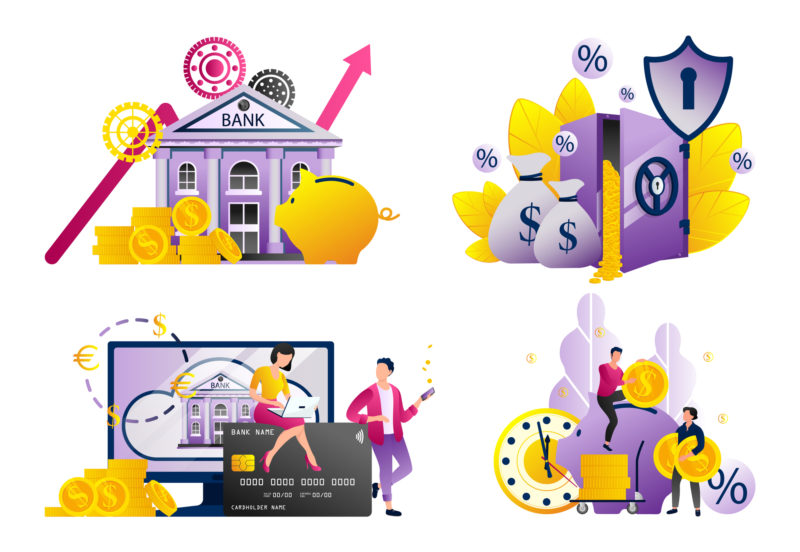It may be tempting to consider purchasing a house or apartment to rent out for a profit. However, investing in a rental property for income and long-term capital growth is not without its challenges. But is owning a rental property worth it?
Financially speaking, due to the genuine risks involved, the return you receive from the rental property must be higher than what you could earn from cautious investments, such as bonds and dividend-paying blue-chip companies.
Additionally, not everyone has the aptitude to oversee the real estate and tenants on a personal level.
We’ve compiled a summary of the pros and cons of renting out a home to help you decide if owning a rental property is worth it for you.
What's Ahead...
Pros Of Owning A Rental Property
Tax Benefits
The Internal Revenue Service (IRS) allows you to deduct expenses that are associated with rental property, including:
- Improvements
- Depreciation
- Ordinary expenses
- Necessary expenses
This means that you can write off the cost of your insurance, mortgage interest, maintenance expenses, and physical wear and tear on your property.
Depreciation may result in a little loss that you can offset against other income. In other words, even if your cash flow is positive after deducting expenses from rental income, your net tax loss will still be negative.
However, you should be aware that depreciation also lowers a property’s cost basis for calculating capital gains when you sell it.
The 2017 Tax Cuts and Jobs Act also grants landlords a number of tax advantages.
You may now deduct 20% of your net rental income if you own a flow-through entity, also referred to as a pass-through business, and operate it as a sole proprietorship, limited liability company, partnership, or S corporation, as long as your total taxable annual income from all sources, after deductions, is less than $250,000 for individuals or $500,000 for married couples who file jointly.
1031 Exchange
You are not required to pay capital gains taxes when you sell one rental property and buy another of “like kind” in a 1031 exchange.
Renting Extra Space
Although you should be aware of the potential pitfalls of renting out extra space, including local zoning regulations, you can also treat a room or area of your home, such as a garage, basement, or accessory dwelling unit, like a rental, writing off a percentage of the mortgage interest and other expenses against its income.
Seasonal Rentals
You can use your property for personal use for up to 14 days annually, or 10% of the days you rent it out to others at fair market value, if you rent your property on a seasonal basis and are entitled to a tax deduction for those costs.
Direct Control
Direct owners of rental property have total control over their money. For instance, landlords are free to select the best tenants, rent out the property for a brief period of time or for an extended period, and to determine when and if it is the right time to sell.
Cons Of Owning A Rental Property
Lack Of Liquidity
Real estate is not a liquid asset. It can easily take several months to finalize a sale, even in the hottest markets. Additionally, if you need to sell quickly due to an emergency or some unforeseen circumstance, you could not get the best price.
Difficult Tenants

Despite your best efforts to thoroughly research potential tenants, you can find yourself with less-than-ideal tenants.
They might, for instance, be needy or demanding, make late payments, fail to turn off the water, and so forth. Or they might be damaging, in which case the tax code’s depreciation limit might be woefully insufficient.
To the normal lease form, you may always add a rider that specifies the conditions of tenancy, acceptance of pets, smoking, tenant insurance, and other issues. Also beneficial in this situation is a security deposit.
Rising Taxes And Premiums
Although the principal and interest on your mortgage may be fixed, there is no assurance that taxes won’t rise more quickly than your ability to raise rents. The cost of insurance could increase, as it does in the aftermath of natural disasters.
Neighborhood Decline
In a perfect world, your rental property will flourish among other well-kept homes, and neighborhood amenities will get better. As a result, your cash flow will continuously improve and your costs will stay the same.
However, communities can shift, and your investment might lose value over time. Just like you would where you live, you should be aware of the local politics in where you invest. By exercising caution, you can reduce this exposure.
Changes To Tax Code
The tax code is subject to change. The tax advantages for house ownership and flow-through enterprises could change in ways that lower or eliminate them entirely.
Being A Landlord
Not everyone is cut out to be a landlord. Conflicts may arise if you are reluctant to raise rents or overly protective of how others treat your property. Your tenants may even become close friends with you, or they may already be related to you or your family.
You risk collecting rent that is far below market value or having a property that is undervalued if you can’t be tough about issues like rent hikes or property maintenance.
Property Upkeep
Both minor and substantial repairs are necessary for property maintenance.
Some property owners find that doing the repairs themselves will save them money. But few people have the time, resources, or expertise for home repairs. You should budget for recurring contractor payments.
Other Considerations
Whether you are purchasing a permanent residence or a rental property, it is important to take the current state of mortgage interest rates into account.
A decent inflation hedge is typically a low fixed-rate mortgage debt. Periodic rent hikes are one strategy for landlords to counteract inflation-driven increases in maintenance costs.
In August 2021, the rate on a 30-year fixed mortgage was 2.875%, compared to an average rate of 8% during the previous 50 years.
Although these rates are advantageous, it’s also crucial to keep in mind that mortgage rates for investment properties are often higher than those for normal homes.
Is Owning A Rental Property Worth It? – Frequently Asked Questions
What Is Considered A Good Rental Yield?
A good rental yield typically falls between 6% and 8%. This is considered reasonable. However, this is dependent on where your property is, as different states and areas can deliver higher or lower returns.
How Do I Calculate My Roi?
To calculate your return on investment, you need to:
- Divide your annual return by the amount of the total investment. For this example, let’s say your investment was $100,000 dollars and your return is $10,000 dollars.
- Your ROI = $10,000 $100,000 = 0.1
- Your total ROI would be 10%.
Final Thoughts
Tax advantages for owning rental properties include the ability to write off insurance, mortgage interest, and upkeep expenses. Rental homes can be financially lucrative.
The disadvantages of owning rental properties, however, include a lack of liquidity, the expense of maintenance, the possibility of dealing with problematic tenants, and a possible loss of the appeal of the neighborhood.
Given the recent changes to the tax code, it is crucial for investors in any kind of real estate to monitor interest rates and get advice from a tax expert.
You’ll be in a better position to decide whether or not becoming a landlord is a wise choice for you if you keep all of this information in mind.
Paul Martinez is the founder of BendingDestiny.com. He is an expert in the areas of finance, real estate, and eCommerce.
Join him on BendingDestiny.com to learn how to improve your financial life and excel in these areas. Before starting this blog, Paul built from scratch and managed two multi-million dollar companies. One in the real estate sector and one in the eCommerce sector.


